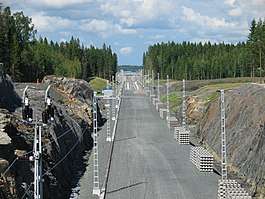Kerava–Lahti railway line
The Kerava–Lahti railway line or Lahden oikorata (Lahti direct line) is a railway line in southern Finland between the towns of Kerava and Lahti, which opened on 3 September 2006.[1]
| Kerava–Lahti railway | |
|---|---|
 Construction of the Kerava–Lahti railway line at Mäntsälä in 2005. | |
| Overview | |
| Locale | Southern Finland |
| Termini | Kerava Lahti |
| Stations | 3 |
| Technical | |
| Line length | 75.7 km (47.0 mi) |
| Number of tracks | Double track |
| Track gauge | 1,524 mm (5 ft) |
| Electrification | 25 kV @ 50 Hz |
| Operating speed | 120 to 220 km/h (75 to 137 mph) |
History
The construction of the Kerava–Lahti railway line took four years and cost €331 million.[2] At the time it was the first new passenger railway to be opened in Finland since completion of the Jämsänkoski–Jyväskylä line in 1977, reducing the journey time between Kerava and Lahti by 26 kilometres. Funding was provided by the Finnish government and the European Union, with the route forming part of the EU's "Nordic Triangle" TEN-T strategic transport route.[3]
Services
The line is used as a shortcut for services from Helsinki to eastern Finnish cities including Kouvola, Kuopio and Joensuu, which all used the line to Riihimäki prior to the construction of the Kerava–Lahti line. The Z train of the Helsinki commuter rail also uses the line.
Future
Proposals exist to build a similar direct railway line from Helsinki Central to Kouvola via Helsinki Airport and Porvoo,[4] which would handle traffic to eastern Finnish cities such as Kuopio, Joensuu, Lappeenranta and Mikkeli, providing a shorter journey time between Helsinki and these cities than currently offered by the Kerava-Lahti line.
Stations
References
- "Lahti - Salpausselän kaupunki". YLE Uutiset. 12 February 2007. Retrieved 4 March 2018.
- "Direct Line will reshape the Finnish network". Railway Gazette. 1 October 2006. Retrieved 4 March 2018.
- "A direct approach to a direct line". Global Railway Review. 31 May 2006. Retrieved 4 March 2018.
- "Helsinki – Kouvola direct link "not economically viable"". International Rail Journal. 5 April 2019.